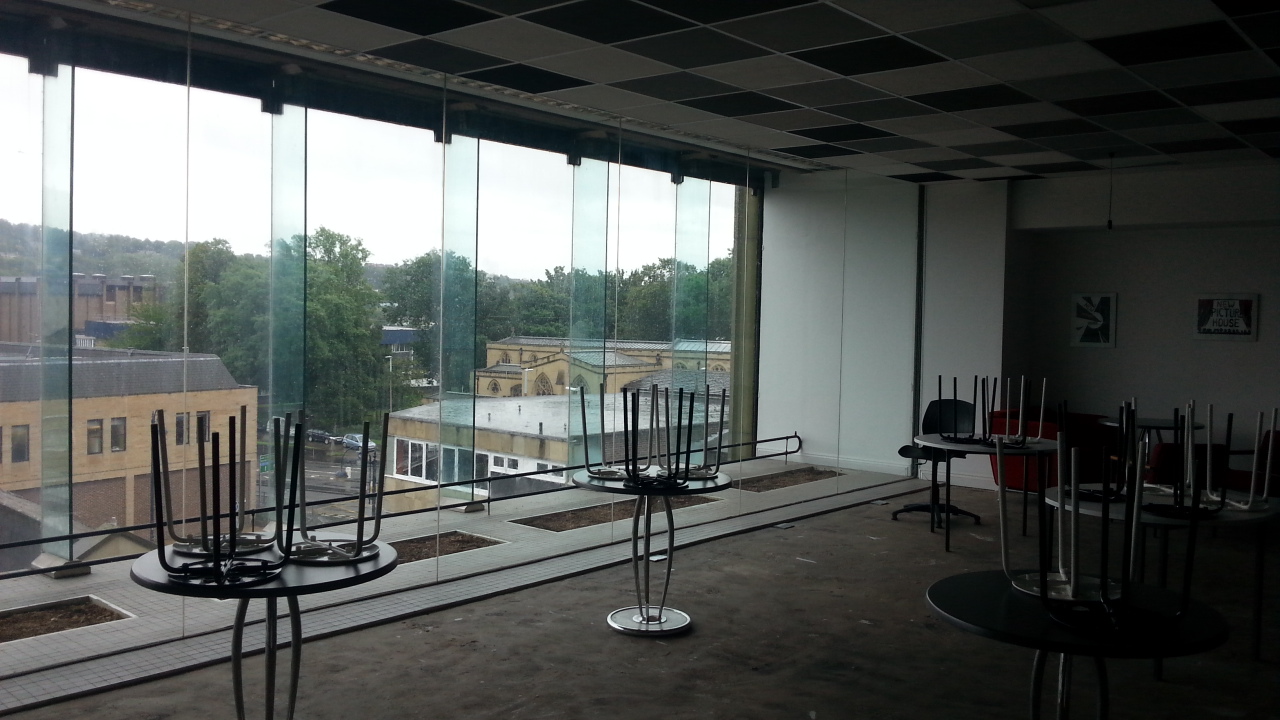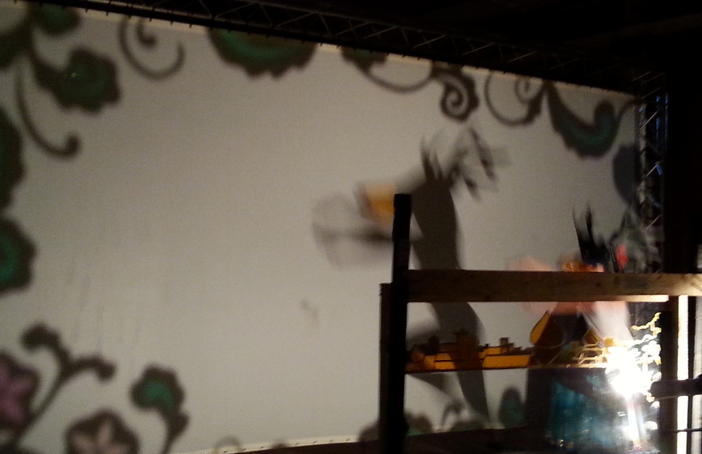MORE THAN A HUNDRED STORIES
More Than 100 Stories is a commission led by artists Sarah Butler and Nicole Mollet that explores and creatively maps the Creative People and Places programme.
Cycling the ‘Northern Belt’| Monday 21st September: Creative Scene, North Kirklees
It is raining in Dewsbury but this town is still immediately beautiful, with its rows of elegant stone buildings. There has been money here – from heavy woollen cloth, I am told, when I ask.
Again, I hear the story of the unloved cousin, the place that has been forgotten, the sense that somewhere else (Huddersfield in this instance) gets all the attention. And yet I am also told about local pride, about very strong attachments to specific places, an appetite for arts activity and a willingness to come along, to talk, to be interested. Still the story of being forgotten, overlooked, but more of a sense of confidence than I've picked up on in other places.
Rebecca tells me there has been a history in this area of new initiatives full of promises and injections of cash over fixed periods of time. 'Things come in and then leave,' she says, 'And so there is an element of distrust.' This is a huge issue for all the CPP projects I think – how to have impact; how to create something that lasts; how to avoid being just another initiative that comes and then leaves – or if that is unavoidable, then the question is how to do it well.

We talk about time. Creative Scene's research questions talk about the long term: If people are involved, if they see, touch, and do creative activity, will they be more likely to continue accessing and looking for such opportunities? If people see high quality art locally will they be encouraged to seek it out for themselves further afield? These things are hard to measure, and the impact Creative Scene is interested in is not immediate – it will happen, if it happens, over time. So when do we ask the questions? When do we claim success or failure?
We talk about language, about trying to develop people's vocabulary so they can talk about what art means to them. How do we open up that conversation? That vocabulary? People round here are 'straight talking', Ruth and Rebecca tell me more than once. They call a spade a spade. We discuss how difficult it is to articulate what a piece of art/theatre/performance is in order to encourage people to come, without dumbing things down, without patronising, without putting people off. Ruth tells me about audience members who'd seen a fantastic theatre production in a pub telling their friends about it: 'It's only four quid; it's only an hour; and if you don't like it you can get a beer.' She feels frustrated by that, I think because it doesn't touch on the content, on the artistic experience, and yet there's something about it as a tag line that I can't help but find appealing.
We talk about inside and outside – how much easier it is to engage with people on the street compared with asking them to step through a door into an inside space.
We talk about accessing different communities – about who can have which conversation with who; about the art activities particularly in the South Asian communities locally which exist but are not necessarily on Creative Scene's 'radar', and about the steps they are taking to develop new relationships and build trust.
Creative Scene have been working intensively with a number of SceneMakers locally. I walk through a park in the rain with local artist Harriet talking about light and fire and future plans. I sit in Andrew's solicitor's office and listen to him talk about putting on an opera in a local nightclub (we thought, let's take the least likely form of entertainment, in the least likely place in the least likely town and invite the least likely people, he told me). I have lunch with Ammaarah in her lunch break from college and talk about how participating in the arts changes how you see the world.
And then finally, I visit Batley and talk with Mandy about the festival and the production of Spellbound planned for the following weekend, and here we do have the conversation about confidence: why us? vs why not us? About raising aspirations, about developing skills, about working with scale and ambition. We slip into the rehearsals for Spellbound and watch two women dance behind a large screen, one wearing a deer's head, the other holding a flower, marking their steps, practising when to jump and how to position themselves in relation to each other. There is something magical about being on this side of the screen, watching the mechanics of light and costume and movement, and imagining just how spellbinding it will be, outside in the square on a darkening Saturday evening.
Sarah Butler

 Sarah Butler
Sarah Butler Nicole Mollett
Nicole MollettFilter by
DATE
- July 2016 (3)
- June 2016 (4)
- May 2016 (3)
- April 2016 (1)
- March 2016 (2)
- February 2016 (2)
- January 2016 (2)
- December 2015 (1)
- November 2015 (2)
- October 2015 (3)
- September 2015 (11)
- August 2015 (4)
- July 2015 (10)
TAGS
- - No value - (14)
- bait (1)
- Batley Festival (1)
- Bentley (1)
- change (1)
- collaboration (2)
- community (2)
- Confidence (4)
- Creative Scene (1)
- cycling (3)
- decision making (1)
- decisionmaking (1)
- Doncaster (1)
- drawing (2)
- East Durham Creates (1)
- engagement (1)
- flying (1)
- Funding (1)
- Glossary (1)
- Granby 4 Streets (1)
- Heart of Glass (3)
- Hull (1)
- In My Place (1)
- landscape (1)
- language (4)
- LeftCoast (2)
- Local (3)
- Manifesto (1)
- Mexborough (1)
- Passion (1)
- People (2)
- postcards (1)
- Process (1)
- quality (1)
- research (1)
- Right Up Your Street (1)
- Ronnie Hughes (1)
- Roots and Wings (1)
- Socially Engaged Art (1)
- Spectacle (1)
- Super Slow Way (2)
- targets (1)
- The Cultural Spring (1)
- Themes (1)
- time (4)
- trust (1)
- visibility (1)







